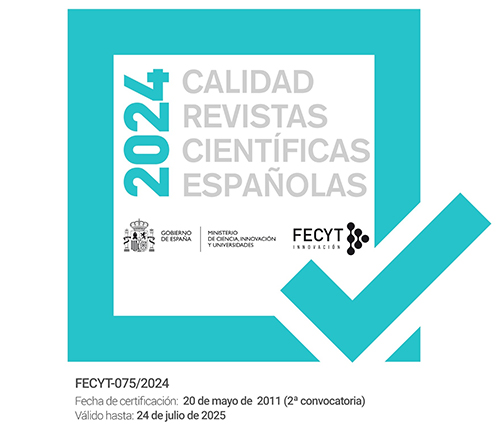Quantum Nmatrices, quasi-sets, and the Kochen-Specker theorem
DOI:
https://doi.org/10.30827/trif.33871Keywords:
N-matrices, Quasi-sets, Quasets, Quantum logic, Kochen–Specker theoremAbstract
We analyze two fundamental premises of the Kochen-Specker theorem: a) the functionality condition FUNC, which expresses the fact that not all observables are independent, nor are the values assigned to them, and b) the issue of the identity of projectors in different measurement contexts. We show that the non-deterministic semantics of Nmatrices and the theory of qsets Q can complement each other by providing an appropriate semantics for the lattice of quantum projectors. Considering valuations that are not homomorphisms and admitting the possibility of having indistinguishable (non-identical) projectors, we establish the basis for a semantics for quantum logic, motivated by an ontology of non-quantum individuals, in which one cannot arrive at the Kochen-Specker paradox.
Downloads
References
Amor-Montaño, J. (2006). Compacidad en la lógica de primer orden y su relación con el teorema de completud. Las Prensas de Ciencias.
Avron, A. and Lev, I. (2005). Non-deterministic multiple-valued structures. Journal of Logic and Computation, 15(3):241–261.
Avron, A. and Zamansky, A. (2010). Non-deterministic semantics for logical systems. In Handbook of Philosophical Logic: Volume 16, pages 227–304. Springer.
Cabello, A., Estebaranz, J., and García-Alcaine, G. (1996). Bell-kochen-specker theorem: A proof with 18 vectors. Physics Letters A, 212(4):183–187.
Cabello Quintero, A. (2002). Pruebas algebraicas de imposibilidad de variables ocultas en mecánica cuántica. Universidad Complutense de Madrid, Servicio de Publicaciones.
da Costa, N. C. A. and Holik, F. (2015). A formal framework for the study of the notion of undefined particle number in quantum mechanics. Synthese, 192(2):505–523.
Dalla Chiara, M. L. and Toraldo di Francia, G. (1993). Individuals, kinds and names in physics. Bridging the gap: philosophy, mathematics, physics, pages 261–283.
de Barros, J. A., Jorge, J. P., and Holik, F. (2021). On the assumptions underlying KS-like contradictions. arXiv preprint arXiv:2103.06830.
Franco de Oliveira, A. J. (2004). Lógica e Aritmética. Ed. Un. Brasília, Brasília.
French, S. and Krause, D. (2006). Identity in physics: A historical, philosophical, and formal analysis. OUP Oxford.
Holik, F. and Jorge, J. P. (2023). Open problems in the development of a quantum mereology: And their ontological implications. In Non-reflexive logics, non-individuals, and the philosophy of quantum mechanics: essays in honour of the philosophy of Décio Krause, pages 157–176. Springer.
Holik, F., Jorge, J. P., Krause, D., and Lombardi, O. (2022). Quasi-set theory: A formal approach to a quantum ontology of properties. Synthese, 200(5):401.
Jech, T. (2003). Set theory: The third millennium edition, revised and expanded. Springer.
Jorge, J. P. and Holik, F. (2020). Non-deterministic semantics for quantum states. Entropy, 22(2).
Jorge, J. P. and Holik, F. (2022). Lógica cuántica, Nmatrices y adecuación, I. Teorema: Revista Internacional de Filosofía, 41(3):65–88.
Jorge, J. P. and Holik, F. (2023). Lógica cuántica, Nmatrices y adecuación, II. Teorema: Revista internacional de filosofía, 42(1):149–169.
Jorge, J. P., Holik, F., and Krause, D. (2023). Un acercamiento a las semánticas Nmatriciales basadas en QST. Principia: an international journal of epistemology, 27(3):8.
Jorge, J. P., Holik, F., and Krause, D. (2025). Relating quasi-sets and rough sets: from quantum entities to AI, DOI: 10.13140/rg.2.2.16057.48483/1.
Kochen, S. and Specker, E. P. (1990). The problem of hidden variables in quantum mechanics. Ernst Specker Selecta, pages 235–263.
Krause, D. (2003). The mathematics of non-individuality. Coleção Documentos, IEA/USP, Series Lógica e Teoria da Ciência.
Krause, D. (2023). A remark on quasi-automorphisms and deformable structures in quasi-set theory and its account to the logical foundations of quantum theory. Preprints.org.
Krause, D. and Jorge, J. P. (2024). Sobre una teoría ‘pura’ de casi-conjuntos y su aplicación a una ontología cuántica de propiedades. Forthcoming in Principia.
Kukla, A. (2001). Theoreticity, underdetermination, and the disregard for bizarre scientific hypotheses. Philosophy of Science, 68(1):21–35.
Lewis, D. K. (1968). Counterpart theory and quantified modal logic. the Journal of Philosophy, 65(5):113–126.
Lewis, D. K. et al. (1986). On the plurality of worlds, volume 322. Blackwell Oxford.
Lombardi, O. and Castagnino, M. (2008). A modal-hamiltonian interpretation of quantum mechanics. Studies in History and Philosophy of Science Part B: Studies in History and Philosophy of Modern Physics, 39(2):380–443.
Lombardi, O. and Dieks, D. (2014). Particles in a quantum ontology of properties. To be published in: "Metaphysics in Contemporary Physics", edited by Tomasz Bigaj and Christian Wüthrich, Poznan Studies 104, 2016.
Mendelson, E. (2009). Introduction to mathematical logic. CRC press.
Nascimento, M. C., Krause, D., and Feitosa, H. d. A. (2011). The quasi-lattice of indiscernible elements. Studia Logica, 97:101–128.
Nelson, E. (1977). Internal set theory: a new approach to nonstandard analysis. Bulletin of the American Mathematical Society, 83(6):1165–1198.
Pascualini, M. (Facultad de Filosofía y Letras, UBA. Tesis de Doctorado, 2025). La Interpretación Modal-Hamiltoniana y su ontología de propiedades posibles: nuevas perspectivas.
Salgado Corbillón, M. (2015). Análisis real no estándar. [Online; accessed 14-March-2025].
Solé Bellet, A. (2010). Realismo e interpretación en mecánica bohmiana [tesis doctoral, Universidad Complutense de Madrid].
Downloads
Published
How to Cite
Issue
Section
License
Copyright (c) 2025 Juan Pablo Jorge, Acacio de Barros

This work is licensed under a Creative Commons Attribution-NonCommercial 4.0 International License.












